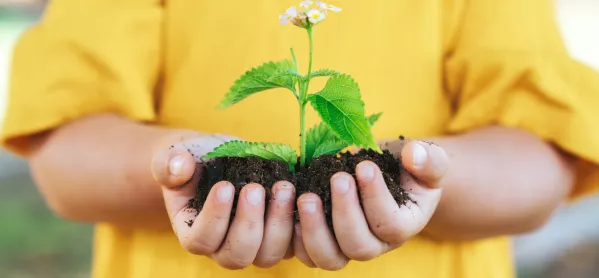I’ve been spending my lockdown days on the school allotment with a group of children. These are vulnerable students, the children of key workers, and students with special needs. They love being at the allotment, but I think I love it even more.
The allotment is situated 50 metres from the school gate and is surrounded by plots belonging to members of the public. I originally set it up to support disadvantaged boys with behavioural issues, hoping that gardening sessions would help them to engage with school more positively.
The results were remarkable: the boys grew in self-confidence and their behaviour got better. More importantly, their attitudes to learning and academic attainment appeared to improve. One student commented that working at the allotment taught him that “there’s more to life than behaving badly”.
The plot has come a long way, too. When we took it over, it was a jungle of weeds and plum trees. Now, it resembles a real allotment - we’ve even made jam!
My gardening expertise is coming along more slowly: I was a novice when we took on the plot and I’m still pretty much a novice now. However, we receive a lot of advice from other plot-holders and it’s great to learn alongside the children.
Coronavirus: School gardening in lockdown
When the government announced schools would stay open for some children during the coronavirus lockdown, my school embraced the opportunity to do something amazing.
Instead of sticking these students in front of computers for five hours of online learning, our headteacher, Laura Ellener, decided we would deliver engaging activities as well as focusing on academic study: dance, art, cooking and allotment sessions, all while following social distancing guidelines. Around 10 students have attended school each day, on average. They come to the allotment in two groups, based on age.
The older students quite enjoy weeding. I sit with them on empty compost bags - two metres apart - picking roots from the soil, and we talk. We talk about how life has changed, but also about other things, like education, family and what our spirit animals would be. I have grown in my appreciation of these teenagers. Getting to know them as individuals seems a privilege we lack time for during normal school life.
Supporting vulnerable children
Some of these students are vulnerable, struggling with difficult home situations or mental health issues. Others have parents in the NHS. Giving them this attention feels important. There is also something calming and unifying about working together. One student announced that being at the allotment feels “spiritual”. We all agreed.
The younger students really enjoy looking for worms. They have endless energy and respond well to the more physical tasks - ripping up ivy, digging and watering. They never talk about the virus. They seem to live fully in the present moment - a helpful reminder for me to try to do the same.
At the moment, we are growing a range of crops, including garlic, cabbages and beetroot. We were also given strawberry plants by a neighbour. One of the students made a beautiful thank-you card, covered in smiling strawberries. It feels great to nurture our relationships with members of the community, especially at a time when connecting with others feels more difficult but also more important.
The two weeks before Easter were productive. Besides all the planting, we’ve made a composter out of pallets, of which we’re all very proud. The older students are keen that we should paint our wooden table and bench after the holiday. They raided the school’s art cupboard and dug out acrylic paints. I have promised I will buy some furniture paint and that we will do it properly.
One Year 11 student told me that our sessions are therapeutic, and I have to agree. There is something wonderful about working outside, alongside others. Coronavirus has deprived many people of their sense of purpose. I am incredibly grateful to have found one.
Lilly Wyatt is pupil premium coordinator at Chiswick School in West London
